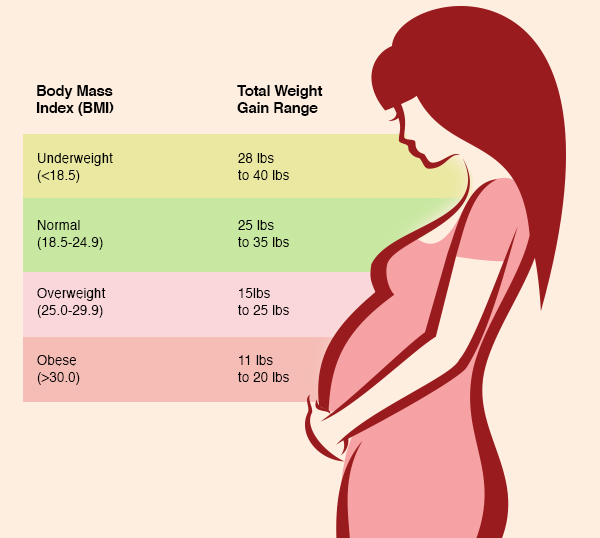April 3, 2020 by John Fernandez
Pregnancy Weight Gain: What’s Healthy?

The answer to the question, “How much weight should I gain during pregnancy?” has long been a topic of debate among health professionals and patients. And news headlines in recent years about the obesity epidemic in the U.S. is spurring heightened concerns that women of childbearing age should watch their weight.
According to experts, women who are pregnant, or thinking of having a baby, should heed the advice of appropriate weight-gain guidelines to prevent health problems that can occur in mother and baby, and sometimes can lead to less-than-optimal fetal development.
“With the pendulum of the whole population swinging towards being heavier, we’re also seeing a increasing population of heavier pregnant women,” says obstetrician and gynecologist Earl E. Gabb, M.D. “Obesity in pregnant women can cause a myriad of dangerous health risks that can lead to obstetric emergencies.”
Dr. Gabb, an OB/GYN hospitalist at Homestead Hospital, where maternity staff helped welcome more than 1,500 newborns last year, points out the number of risk factors that increase with excessive weight gain during pregnancy, including gestational diabetes, large babies and hypertensive disorders.
“The two highest reasons for maternal morbidity are preeclampsia and thromboembolic events,” Dr. Gabb says. “When increased hormonal levels, like estrogen, during pregnancy combine with a lot of excess weight, chances of developing preeclampsia, diabetes and vascular problems, like deep vein thrombosis (DVT), increase dramatically, causing concern for mother and baby, placing the pregnancy in high-risk.”
The more weight a woman gains while pregnant also increases her risk for cesarean delivery due to large babies, often decreasing her mobility, Dr. Gabb adds. This, in turn, increases her chances of thrombotic events, like blood clots in the legs that can lead to life-threatening pulmonary embolism.
Because of obesity’s ramifications on pregnancies, leading medical and academic organizations have published position statements in recent years, including the American College of Obstetricians and Gynecologists and Academy of Nutrition and Dietetics, stressing the importance of healthy nutrition and lifestyle during pregnancy.
Weight-gain Recommendations

While no new pregnancy weight-gain guidelines have been issued by ACOG, says Dr. Gabb, the Institute of Medicine (IOM) recommends pregnancy weight gain ranges between 11 and 40 pounds, depending on a woman’s pre-pregnancy body mass index (BMI). Being obese before getting pregnant automatically places a woman at risk for pregnancy-related complications, Dr. Gabb says. An IOM study found nearly two-thirds of women of childbearing age were classified as overweight or obese.
“Obese women have higher rates of c-section births, compared to women of normal weight, which adds a number of surgical risks to both mother and baby,” says Dr. Gabb. “Spinal epidurals are often difficult in obese women, and they instead have to be intubated with general anesthesia, increasing the risk of respiratory complications for mom and baby, such as aspiration pneumonitis in mom and suppressed respiratory function in baby.”
Dr. Gabb adds that after a c-section, an obese mother remains at high-risk and must be urged to get up and move to avoid post-surgical blood clots.
In addition to health risks obesity during pregnancy poses to a mother’s health, Dr. Gabb says the excess weight often means larger babies, which can have adverse affects during delivery. The most common injury to babies during difficult vaginal deliveries, he says, is shoulder dystocia, a complication that can occur when the baby’s shoulder gets stuck inside the mother’s body. When shoulder dystocia can injure the nerves in the neck, entrapment of the umbilical cord can lead to brain injury and be life-threatening to the baby, he said.
To curb chances of gaining too much weight during pregnancy, Dr. Gabb urges comprehensive pre-natal care, including early screening for gestational diabetes and having a candid discussion with your doctor about the risk factors of packing on the pounds while pregnant. Preconception counseling for women with higher BMIs is recommended. In general, he advises maternity patients to use common sense: Watch what you eat by eating nutritious and balanced meals, and maintain a healthy level of physical exercise throughout pregnancy.
top stories












There are no comments